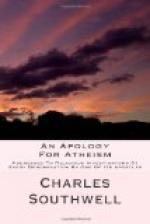Phillip the Fifth, as may be seen in Coxe’s Memoirs of the Kings of Spain, ’presented about the year 1172, three standards taken from ‘infidels’ to our lady of Atocha; and sent another to the Pope, as the grateful homage of the Catholic King to the head of the Church. He also, for the first time, attended the celebration of an Auto da Fe, at which in the commencement of his reign he had refused with horror to appear, and witnessed the barbarous ceremony of committing twelve Jews and Mohammedans to the flames.’ So great during times inclined to religion was inquisitorial power, that monarchs and statesmen of liberal tendencies were constrained to quail before it. It is related that a Jewish girl, entered into her seventeenth year, extremely beautiful, who in a public act of faith, at Madrid, June 30th, 1680, together with twenty others of the same nation of both sexes, being condemned to the stake, turned herself to the Queen of Spain, then present, and prayed, that out of her goodness and clemency she might be delivered from the dreadful punishment of the fire. ‘Great Queen,’ said she, ’is not your presence able to bring me some comfort under my misery? Consider my youth, and that I am condemned for a religion which I have sucked in with my mother’s milk.’ The Queen turned away her eyes, declaring, she pitied the miserable creature, but did not dare to intercede for her with a single word.
Not only have Roman Catholic writers defended these inquisitorial abominations, but, with what every Protestant must needs consider daring and blasphemous impiety, laboured to prove that the first Inquisitor was God himself. Luis de Paramo, for instance, in his book ’De Origine et Progressu Officii Sanctoe Inquisitionis, ejusque dignitate et utilitate,’ proves God to be the first Inquisitor, and that in the Garden of Eden was the first auto da fe.
Nor do these most pious casuists discover anything in Scripture which forbids the burning of heretics, notwithstanding such texts as ‘Whosoever sheddeth man’s blood by man shall his blood be shed,’ which they contend inquisitors do never violate the true meaning or spirit of, it being evident that to burn men is not to shed their blood—thus eluding the maxim Ecclesia non novit sanguinem. And if their right to burn heretics was questioned they triumphantly cited the text (as given in the ‘Beehive’ of the Romish Church) ’Whosoever doth not abide in me, shall be cast out of the vineyard as a branch and there wither; and men gather those branches and cast them into the fire and burn them.’
On this text John Andreas, Panormitamis, Hostraensii, Bernardus Leizenburgen, and others of the Roman Catholic casuists built up their proof that heretics, like grape branches, should be cast into the fire and burnt.




